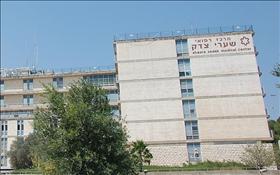Israel is categorized as 'High' on the 'Government Restrictions Index'
Pew's 2017 Global Restrictions on Religion Report
According to the Pew Research Center's recent report, Israel is among the 11 worst countries in the world for the 'Social Hostilities Index', categorized along with Syria, Nigeria, and Afghanistan as 'Very High'.
Uri Regev 21/04/2017 01:46
Tags: religious discrimination · Shaare Zedek Medical Center · Pew Research Center

Shaare Zedek Medical Center, Jerusalem, source: Wikipedia
As underscored by current events, between the renewed political Orthodox assault on the Supreme Court over Shabbat enforcement in Tel Aviv, and Hiddush's taking up incidents involving the exclusion of women for fundamentalist religious reasons, as well as the shirking of responsibility on the part of the Shas controlled Ministry of Religious Affairs to provide citizens the legally mandated civil burial alternative, there's never a dull moment in the ongoing battle for religious freedom and equality in Israel.
Providing further international comparative context for the clash of religion & state in Israel, you may find interest in the Pew's new Global Restrictions on Religion report released this month. It's not surprising for those of us who have been laboring in this field for years, but surely a rude awakening for those who are less versed.
According to the Pew Research Center's recent report, Israel is among the 11 worst countries in the world for the 'Social Hostilities Index', categorized along with Syria, Nigeria, and Afghanistan as 'Very High'. Israel is also categorized as 'High' for the 'Government Restrictions Index', sandwiched on the list between Sudan and the UAE.
While Shaare Tzedek's director stated on camera that if a couple insists on being served by their hospital, their wish would be granted, the hidden camera clips that were broadcast showed the opposite.
In addition to the more prominent current events, this week's media also highlighted an extremely disturbing practice among a number of Israel's hospitals, which are religiously oriented but publicly funded, including Jerusalem's biggest hospital Shaare Tzedek. They refuse to grant IVF services to women who cannot demonstrate that they are halakhically married under the auspices of Israel's Chief Rabbinate. Many women cohabitating with their partners or civilly married overseas were turned down when requesting IVF treatment. While Shaare Tzedek's director stated on camera that if a couple insists on being served by their hospital, their wish would be granted, the hidden camera clips that were broadcast showed the opposite.
These are just the examples from this week's crop, and rest assured more are coming shortly. We hope you had a meaningful and enjoyable Passover and even though matzah is no longer mandatory, we trust that the essence of the festival - the struggle for freedom - will us in the days to come.